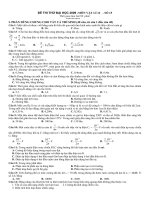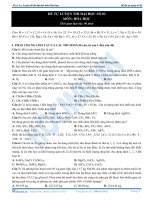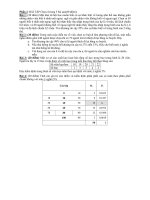PASSAGE 15
Bạn đang xem bản rút gọn của tài liệu. Xem và tải ngay bản đầy đủ của tài liệu tại đây (36.41 KB, 2 trang )
PASSAGE 15
The body language people use often communicates more about their feelings than the words they are
saying. We use body movements, hand gestures, facial expressions, and changes in our voice to
communicate with each other. Although some body language is universal, many gestures are culturally
specific and may mean different things in different countries.
If you want to give someone the nod in Bulgaria, you have to nod your head to say no and shake it to
say yes – the exact opposite of what we do! In Belgium, pointing with your index finger or snapping your
fingers at someone is very rude.
In France, you shouldn’t rest your feet on tables or chairs. Speaking to someone with your hands in
your pockets will only make matters worse. In the Middle East, you should never show the soles of your
feet or shoes to others as it will be seen as a grave insult. When eating, only use your right hand because
they use their left hands when going to the bathroom.
In Bangladesh, the ‘thumbs-up’ is a rude sign. In Myanmar, people greet each other by clapping, and in
India, whistling in public is considered rude.
In Japan, you should not blow your nose in public, but you can burp at the end of a meal to show that
you have enjoyed it. The ‘OK’ sign (thumb and index finger forming a circle) means ‘everything is good’
in the West, but in China it means nothing or zero. In Japan, it means money, and in the Middle East, it is
a rude gesture.
Question 1. It is mentioned in the passage that many gestures __________
A. may mean different things in different countries
B. are not used to communicate our feelings
C. can be used to greet each other in public
D. are used in greeting among men and women
Question 2. People nod their head to say no in __________
A. Belgium
B. Bulgaria
C. France
D. Japan
Question 3. In the Middle East, people do not use their left hands for eating because they use their left
hands ________
A. when going to the bathroom
B. when preparing the meal
C. to put in their pockets
D. to clean their tables and chairs
Question 4. Which of the following is NOT true according to the passage?
A. In France, people shouldn’t rest their feet on tables.
B. In Belgium, snapping your fingers at someone is very rude.
C. In China, the ‘OK’ sign means money
D. In Myanmar, people greet each other by clapping
Question 5. The word “others” in paragraph 3 refers to __________
A. other
B. other shoes
C. other soles
D. other feet
Question 6. The word “insult” in the passage means____________.
A. an offensive action B. a compliment
C. a question
D. an impolite greeting
Question 7. What is the best title for the passage?
A. Means of communication.
B. How to use body language in Middle East.
Page 1
C. Gestures and their different meanings.
D. Body language and cultural differences.
ĐÁP ÁN
1-A
2-B
6-A
7-D
3-A
4-C
5-C
LỜI GIẢI CHI TIẾT
Question 1:
Thể hiện ở câu: [many gestures are culturally specific
and may mean different things in different countries] :
nhiều cử chỉ là văn hóa cụ thể và có thể có nhiều nghĩa
khác nhau ở nhiều đất nước khác nhau.
Question 2:
Thể hiện ở câu: Bulgaria, you have to nod your head to say no and shake it to say yes
Question 3:
Thể hiện ở câu: In the Middle East, you should never show the soles of your feet or shoes to others as it
will be seen as a grave insult. When eating, only use your right hand because they use their left hands
when going to the bathroom
Question 4:
Thể hiện ở câu: [The ‘OK’ sign (thumb and index finger forming a circle) means ‘everything is good’ in
the West, but in China it means nothing or zero]
Question 5:
“In the Middle East, you should never show the soles of your feet or shoes to others as it will be seen as a
grave insult” => ở Trung Đơng, bạn khơng nên để gót chân hay đế giày hướng với cái kia (gót chân kia,
đế giày kia) bởi nó được coi là sự xúc phạm.
Question 6:
Insult (n): một hành động gây hấn, xúc phạm = an offensive action
Compliment (n): lời khuyên
Greeting (n): lời chào hỏi
Question 7:
Skimming bài khóa, tác giả nói đến ngơn ngữ cơ thể và việc sử dụng chúng ở các nước khác nhau. Một cử
chỉ này có thể được coi là lịch sự ở nước này nhưng có thể là bất lịch sự ở nước khác, ....
Page 2









